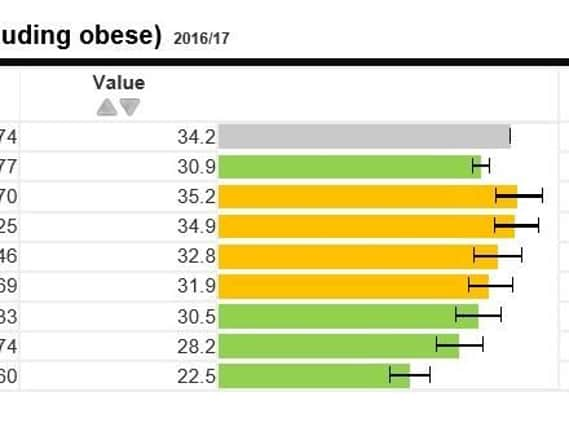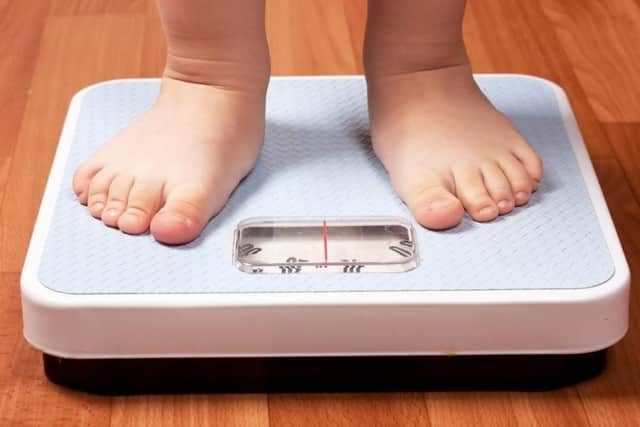Number of overweight and obese children in Mansfield is above national average.


A report from Public Health England shows that although the national average of overweight and obese children is 34.2 percent, the number in Mansfield stands at 35.2 percent.
Youngsters are measured in reception and in year six.
The government has tried to curb the rate of obesity in the UK, introducing a sugar tax in a bid to slash sugar consumption.
Advertisement
Hide AdAdvertisement
Hide Ad

The estimated £520m raised by the levy will contribute to boosting primary school sports.
There is also pressure on the government to ban junk food adverts on TV before 9PM, restrict price promotions for sugary food and drinks in supermarkets, and calls for a ban on cartoon characters on high sugar foods like cereals.
NHS digital published figures in April that revealed In 2016/17, there were 617 thousand admissions in NHS hospitals where obesity was a factor.
This is an increase of 18 per cent on 2015/16.


The same data shows that only 16 percent of children eat the recommended five portions of fruit and vegetables a day.
Advertisement
Hide AdAdvertisement
Hide AdIn Notts, programmes such as the healthy option takeaway (HOT)scheme have been introduced in a bid to reduce the county’s weight problems.
The HOT merit scheme is run by Nottinghamshire County Council and District and Borough Council partners.
The scheme aims to increase the amount and variety of healthier options in takeaways across Nottinghamshire to help consumers to maintain a more balanced diet.
Takeaways that qualify as HOT are making positive changes to how they prepare, serve and display their food to help customers make healthier choices.
Advertisement
Hide AdAdvertisement
Hide AdThe council’s everyone health scheme uses a team of experts such as nutritionists, dietitians, and physical activity specialists to enable people to manage their weight.
John Wilcox of Notts County Counil said: “Child overweight and obesity levels are high which is not good for the health and wellbeing of children. But in Nottinghamshire the overall levels (not including Nottingham City) are significantly lower than England [green bars] which is mainly due to the particularly low prevalence in the Rushcliffe area . The Mansfield, Ashfield, Bassetlaw and Newark and Sherwood areas have levels of child overweight and obesity statistically similar to the England levels [yellow bars].
“We are working with Nottinghamshire’s Health & Wellbeing Board to make Nottinghamshire a more Healthy Place. Our current programmes include the Healthy Options Takeaway scheme where we work with food outlets to support them to make pledges to provide more low fat low sugar options to customers.
“We also give advice to the Planning Authorities on policies to ensure new housing developments enable people to be physically active and that there are restrictions on the development of takeaway fast food outlets. We are working with Active Notts who are doing work in parts of Mansfield with local people and the local council to address barriers to being more active in their lives.
Advertisement
Hide AdAdvertisement
Hide Ad“Nottinghamshire Public Health commissions Everyone Health to provide the county’s Obesity Prevention and Weight Management Service. The service is able to support schools, workplaces and community groups to plans how they can be more active and eat more healthy. Everyone Health also run the county’s weight management service for children and families and adults. If anyone in Nottinghamshire who is concerned about their weight or their families they can give Everyone Health a ring on tel: 0333 005 0092.”
What can you do as a parent?
The NHS has found that children who achieve a healthy weight tend to be fitter, healthier, better able to learn, and more self-confident.
It can be difficult for parents to tell if their child is overweight.
The average ten year old boy needs around 2,032 calories a day, and a girl needs around 1,936.
Advertisement
Hide AdAdvertisement
Hide AdA healthy, balanced diet for children aged 7 to 10 should include:
At least 5 portions of a variety of fruit and vegetables every day
Meals based on starchy foods, such as potatoes, bread, pasta and rice (choose wholegrain varieties when possible)
Some milk and dairy products (choose low-fat options where you can)
Advertisement
Hide AdAdvertisement
Hide AdSome foods that are good sources of protein, such as meat, fish, eggs, beans and lentils
Here are five ways to help your child maintain a healthy weight.
Lead by example - by eating well and being active, children will be encouraged to do the same, and fun activities like swimming is a good way top spend time as a family.
Get active - The NHS reccommends 60 minutes of physical activity a day for children, but it doesn’t all have to be in one go. Bike riding, walking to school and playing in the park all count.
Advertisement
Hide AdAdvertisement
Hide AdWatch your child’s portions - Start meals with small servings and let your child ask for more if they’re still hungry. Avoid using adult-size plates for younger children as it encourages them to eat oversized portions.
Eat well - Children need five portions of fruit and vegetables a day, just like adults. For tips on how to incorporate them into your diet, see here: https://www.nhs.uk/live-well/eat-well/5-a-day-and-your-family/
Limit screen time and encourage a good bedtime routine - As well as getting your kids moving, it’s a good idea to limit the time they spend being inactive. NHS guidance advises parents to limit their child to two hours of television each day, and ban electronic devices from bedrooms at night. Children who don’t get enough sleep are more likely to suffer weight problems.
Information from NHS England.